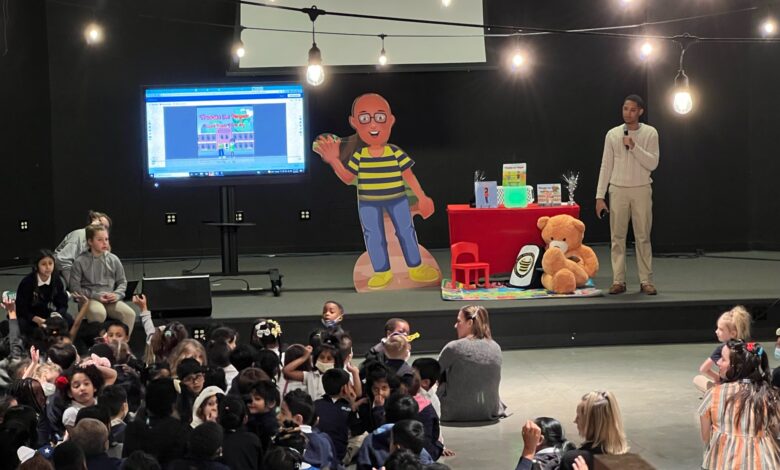The Future of Book Publishing: Insights from Franklin Edwards

The book publishing industry is in a state of continuous transformation. Even more so in the wake of the COVID-19 pandemic, which challenged the traditional ways of publishing, it has paved the way for novel trends and opportunities. Franklin Edwards, author of 14 children books and the owner of the Franklin Books bookstore in Plano, Texas, shared with us his experience witnessing the dynamic trends shaping the post-COVID landscape of the book publishing industry. Franklin, age 23, is a unique figure in the publishing world, often thinking out of the box.
Franklin’s journey commenced when he was just 21. “I had no real direction or plan for my life, and I was just doing 21-year-old things,” he reflects candidly, “like sleeping the day away.” But, life took a fascinating turn when his mother posed a question that would alter his trajectory. “Have you ever considered writing a book?” she asked. Little did Edwards know that this simple question would set him on a path to becoming a published author and the CEO of a flourishing publishing business.
One of the key trends that Edwards dissects is the role of Artificial Intelligence (AI) in the publishing process. AI has revolutionized the industry by streamlining various tasks, from generating stories to crafting illustrations. As he elaborates, “AI is a powerful tool, and it can certainly automate many aspects of the publishing process. However, it can never replicate the emotional depth and authenticity that human authors bring to their work.”
Edwards asserts that while AI has its advantages, the human connection remains an irreplaceable element. He highlights that readers can discern the difference between AI-generated content and human-crafted stories. “A human author infuses their work with genuine emotion and perspective, and readers can feel that authenticity,” he notes. The future may see AI assisting authors and publishers, but the essence of the human touch is here to stay, according to Franklin.
In an era when most bookstores fold up, Franklin decided to swim against the current and establish a shop in Plano, Texas. Edwards believes in the resilience of physical bookstores. He underscores the unique connection that readers have with physical books, emphasizing the tactile experience and the emotional bond forged with printed literature. “There is something inherently intimate about holding a physical book in your hands and turning its pages,” Edwards says.
Having established his bookstore, Edwards has witnessed firsthand the enduring appeal of brick-and-mortar bookshops. As he points out, “Bookstores are not merely places to purchase books; they are spaces where readers can immerse themselves in a world of knowledge and imagination.”

While Edwards benefited from book publishing, he did not want to keep the knowledge all to himself. Edwards envisions a future where more individuals take up the mantle of becoming authors. He believes that technology has made publishing more accessible and affordable, thereby creating a platform for a surge in new authors. “People have stories to share, experiences to narrate, and knowledge to impart,” Edwards explains. He encourages aspiring authors to embrace storytelling and says that readers appreciate raw and honest narratives. “It’s essential to be authentic in your writing,” he advises. “Don’t shy away from addressing real-life complexities. Readers, including children,” he stresses, “can discern and appreciate the truth.”
In the realm of children’s literature, Edwards shares three fundamental principles that aspiring children’s book authors should embrace:
“When writing for children, don’t feel the need to oversimplify language or concepts,” Edwards urges. He believes that children are capable of understanding and appreciating more complex ideas and vocabulary. “Challenge young readers and introduce them to new words and ideas,” he suggests. By doing so, authors can enrich the reading experience and help children expand their knowledge.
“Be honest in your storytelling,” Edwards says. He believes that sugarcoating stories or presenting an idealized version of the world can hinder a child’s understanding of reality. “Children are remarkably perceptive, and they can handle the truth,” he emphasizes. Authenticity in storytelling helps children grasp real-life complexities and learn how to navigate challenges.
Edwards stresses the importance of inclusivity in children’s literature. “Books should reflect the diverse world children live in,” he stresses. He encourages authors to create stories that portray a wide range of characters, backgrounds, and experiences. “Children should see themselves in the stories they read, but they should also encounter a rich tapestry of characters that represent the diversity of our world.”
When asked about his vision for the future, Edwards is ambitious. In ten years, he envisions receiving a Nobel Prize in writing, an accolade that would underscore his profound impact on the literary world. He plans to expand his bookstore chain to 30 locations, bringing the joy of reading to communities far and wide. He aspires to publish over a hundred more books, continuing to influence young minds and impart valuable lessons. “This wasn’t even supposed to happen,” he reflects pointing at a shelf with his books at his bookstore, “so ten years from now, who knows? I’m just getting started.



